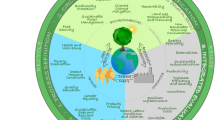Abstract
As an emerging topic, circular economy is said by several authors to be a new driver to sustainability, while others claim its just a new concept within the sustainability spectrum. This study aims to analyse the relation between the constructs of circular economy and sustainability, supported by a literature review.
Access this chapter
Tax calculation will be finalised at checkout
Purchases are for personal use only
Similar content being viewed by others
References
Bilitewski, B.: The Circular Economy and its risks. Waste Manag. 32(1), 1–2 (2012). https://doi.org/10.1016/j.wasman.2011.10.004. (Elsevier Ltd.)
Bocken, N.M.P., et al.: Product design and business model strategies for a circular economy. J. Ind. Prod. Eng. 33(5), 308–320 (2016). https://doi.org/10.1080/21681015.2016.1172124
Bocken, N.M.P., Rana, P., Short, S.W.W.: Value mapping for sustainable business thinking. J. Ind. Prod. Eng. 32(1), 67–81 (2015). https://doi.org/10.1080/21681015.2014.1000399
Bocken, N.M.P., Ritala, P., Huotari, P.: The circular economy: exploring the introduction of the concept among S&P 500 firms. J. Ind. Ecol. 21(3), 487–490 (2017). https://doi.org/10.1111/jiec.12605
Brown, B.J., et al.: FORUM global sustainability: toward definition. Environ. Manage. 11(6), 713–719 (1987). https://doi.org/10.1007/BF01867238
Cambridge University Press.: Cambridge Dictionary (2018). Available at: https://dictionary.cambridge.org/
Chen, J.Z.: Material flow and circular economy. Syst. Res. Behavior. Sci. 26(2), 269–278 (2009). https://doi.org/10.1002/sres.968
Chertow, M.R.: Industrial Symbiosis: Literature and Taxonomy. Annu. Rev. Energy Env. 25(1), 313–337 (2000). https://doi.org/10.1146/annurev.energy.25.1.313
Colbert, B.A., Kurucz, E.C.: Three conceptions of triple bottom line business sustainability and the role for HRM. Hum. Resour. Plann. (2007)
Confederação Nacional da Indústria: Economia circular: oportunidades e desafios para a indústria brasileira. Brasília/DF, Brasil (2018)
Dixon, J.A., Fallon, L.A.: The concept of sustainability: origins, extensions, and usefulness for policy. Soc. Nat. Resour. 2(1), 73–84 (1989). https://doi.org/10.1080/08941928909380675
Elkington, J.: Cannibals with forks—the triple bottom line of 21st century business. Environ. Qual. Manage. 8(April), 424 (1998). https://doi.org/10.1002/tqem.3310080106
Ellen MacArthur Foundation.: Towards a Circular Economy: Business Rationale for an Accelerated Transition (2015) (2012-04-03)
Ellen MacArthur Foundation.: Intelligent Assets: Unlocking the Circular Economy Potential. Ellen MacArthur Foundation (2016). Available at: http://www.ellenmacarthurfoundation.org/assets/downloads/publications/EllenMacArthurFoundation_Intelligent_Assets_080216.pdf
Frenken, K.: Political economies and environmental futures for the sharing economy. Philos. Trans. Royal Soc. A Math. Phys. Eng. Sci. 375(2095), 1–36 (2017). https://doi.org/10.1098/rsta.2016.0367
Geissdoerfer, M., et al.: The circular economy—a new sustainability paradigm? J. Clean. Prod. 143(January), 757–768 (2017). https://doi.org/10.1016/j.jclepro.2016.12.048
Ghisellini, P., Cialani, C., Ulgiati, S.: A review on circular economy: the expected transition to a balanced interplay of environmental and economic systems. J. Cleaner Prod. 114, 11–32 (2016). https://doi.org/10.1016/j.jclepro.2015.09.007. (Elsevier Ltd.)
Graedel, T.E., Allenby, B.R.: Industrial Ecology. Prentice Hall, Englewood Cliffs, NJ (1995)
Homrich, A.S., et al.: The circular economy umbrella: trends and gaps on integrating pathways. J. Clean. Prod. 175, 525–543 (2018). https://doi.org/10.1016/j.jclepro.2017.11.064
Isil, O., Hernke, M.T.: The triple bottom line: a critical review from a transdisciplinary perspective. Bus. Strategy Environ. 26(8), 1235–1251 (2017). https://doi.org/10.1002/bse.1982
McDonough, W., Braungart, M.: Cradle to cradle: remaking the way we make things. North Point Press, New York (2002)
Milne, M.J., Kearins, K., Walton, S.: Creating adventures in wonderland: the journey metaphor and environmental sustainability. Organization 13(6), 801–839 (2006). https://doi.org/10.1177/1350508406068506
Mirabella, N., Castellani, V., Sala, S.: Current options for the valorization of food manufacturing waste: a review. J. Cleaner Prod. 65, 28–41 (2014). https://doi.org/10.1016/j.jclepro.2013.10.051. (Elsevier Ltd.)
Mulrow, J.: Worldwatch Institute, Can the Circular Economy Really Make the World More Sustainable? (2017). Available at: http://blogs.worldwatch.org/circular-economy-sustainable/. Accessed 22 Sept 2018
Murray, A., Skene, K., Haynes, K.: The circular economy: an interdisciplinary exploration of the concept and application in a global context. J. Bus. Ethics 140(3), 369–380 (2017). https://doi.org/10.1007/s10551-015-2693-2
Oram, P.A.: Moving toward sustainability building the agroecological framework. Environ. Sci. Policy Sustain. Dev. 30(9), 14–36 (1988). https://doi.org/10.1080/00139157.1988.9930910
Rogers, D.S., Tibben-Lembke, R.S.: Going Backwards: Reverse Logistics Trends and Practices. Reverse Logistics Executive Council (1998)
Sauvé, S., Bernard, S., Sloan, P.: Environmental sciences, sustainable development and circular economy: alternative concepts for trans-disciplinary research. Environ. Dev. 17, 48–56 (2016). https://doi.org/10.1016/j.envdev.2015.09.002
Smol, M., et al.: The possible use of sewage sludge ash (SSA) in the construction industry as a way towards a circular economy. J. Clean. Prod. 95, 45–54 (2015). https://doi.org/10.1016/j.jclepro.2015.02.051
Su, B., et al.: A review of the circular economy in China: moving from rhetoric to implementation. J. Clean. Prod. 42, 215–227 (2013). https://doi.org/10.1016/j.jclepro.2012.11.020
Tukker, A.: Eight types of product-service system: eight ways to sustainability? Experiences from suspronet. Bus. Strategy Environ. 13(4), 246–260 (2004). https://doi.org/10.1002/bse.414
Tukker, A.: Product services for a resource-efficient and circular economy—a review. J. Clean. Prod. 97, 76–91 (2015). https://doi.org/10.1016/j.jclepro.2013.11.049
World Commission on Environment and Development.: Brundtland Report: Our Common Future (1987). Available at: http://www.un-documents.net/our-common-future.pdf
York Jr, E.T.: Improving sustainability with agricultural research. Environ. Sci. Policy Sustain. Dev. 30(9), 18–40
Yuan, Z., Bi, J., Moriguichi, Y.: The circular economy: a new development strategy in China. J. Ind. Ecol. 10(1–2), 4–8 (2006). https://doi.org/10.1162/108819806775545321
Acknowledgements
This study was financed in part by the Coordenação de Aperfeiçoamento de Pessoal de Nível Superior-Brasil (CAPES)-Finance Code 001.
Author information
Authors and Affiliations
Corresponding author
Editor information
Editors and Affiliations
Rights and permissions
Copyright information
© 2020 Springer Nature Switzerland AG
About this paper
Cite this paper
Abadia, L.G., de Carvalho, M.M. (2020). Is Circular Economy a New Driver to Sustainability?. In: Leiras, A., González-Calderón, C., de Brito Junior, I., Villa, S., Yoshizaki, H. (eds) Operations Management for Social Good. POMS 2018. Springer Proceedings in Business and Economics. Springer, Cham. https://doi.org/10.1007/978-3-030-23816-2_111
Download citation
DOI: https://doi.org/10.1007/978-3-030-23816-2_111
Published:
Publisher Name: Springer, Cham
Print ISBN: 978-3-030-23815-5
Online ISBN: 978-3-030-23816-2
eBook Packages: Economics and FinanceEconomics and Finance (R0)




